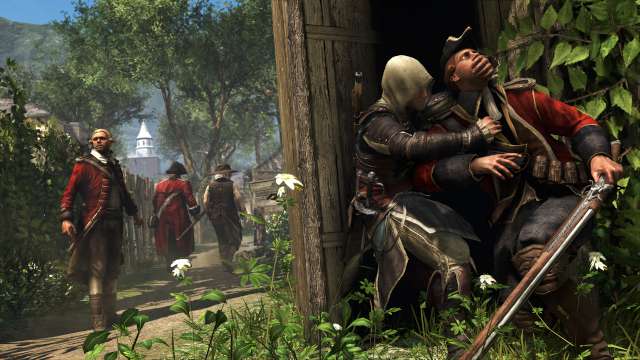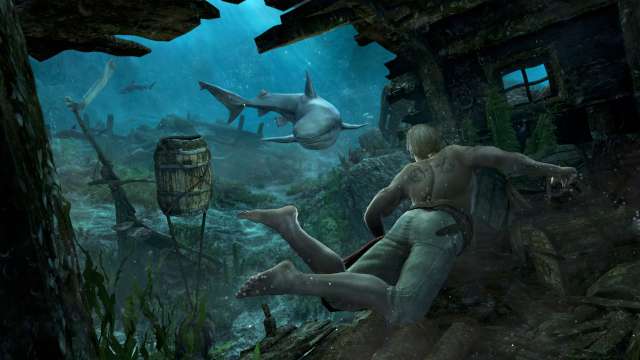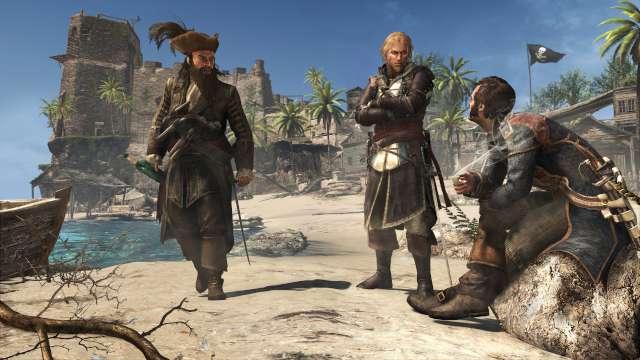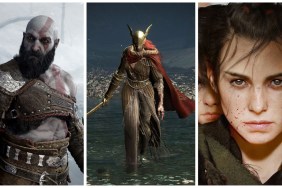Damnation seize my soul if I give your quarters, or take any from you.
[Next-Gen Update: Assassin's Creed IV: Black Flag, as you would expect on the next-gen consoles, has finer detail on the PS4 and Xbox One compared to the PS3 and Xbox 360 versions. The difference in resolution is difficult to discern at first glance, but it's in the weave of the fabric, the clarity of the waves, and the graininess of the wood. In fact, the enhanced graphics aren't that obvious unless you're on the Jackdaw and pay attention to the passing water and the textures of the decks, sails, and hulls. However, the improvement isn't enough where owners of the Xbox 360 and PS3 versions should feel guilty or that they're missing out.]
The hypothetical "ninjas vs. pirates" rivalry has been a gaming meme on Internet forums for nearly a decade. Maybe it's that ninjas and pirates are both cool but in completely opposing ways. Maybe it's the "West vs. East" idea. Maybe it's about letting our imagination run wild. Maybe it's me, the lone resident ninja, being surrounded by all sides by pirates collectively known as GameRevolution. But this enduring battle rejects the possibility, however blasphemous it may be, that both sides can let bygones be bygones, become unlikely allies, and conquer the world as the almighty, all-fearing ninja pirates they were meant to be. That might sound ridiculously impossible, but Assassin's Creed IV: Black Flag would prove otherwise.
Edward Kenway, befitting his capacity for piracy, doesn't conform to the tropes of the traditional protagonist in the Assassin's Creed series. Within the opening sequence, he merely stumbles into the longstanding conflict between the Assassins and the Templars, stealing the iconic white-hooded outfit and a curious trinket that might earn him the coin he so doggedly desires. That said, the Assassins and the Templars both recognize and fear his natural talent, which might as well be at the level of a master assassin, and wish Edward to align himself with their cause.
However, Edward is uninterested and almost intentionally ignorant of this cloak-and-dagger war in the face of his insatiable search for riches in The New World of 1715. His desire for a better life with his love interest leads him to leave her behind in England, despite her plea to have him abandon his pursuits and settle down with a steady income. The lure of the West Indies, where any free man can become a "profiteer" and plunder his way to the top of the ladder, compels him to protect and establish a pirate chokehold upon the Caribbean sea with the assistance of Blackbeard and other legendary pirates.
Meanwhile in the present day, you are pit in first-person perspective as a new employee for Abstergo Entertainment—Ubisoft's humorous self-commentary as a game company—who has an uncanny ability to access Edward's memories through the Animus. Following the events of Assassin's Creed III, Abstergo is attempting to salvage whatever it can from the fallout, but prior characters from the first story arc (to keep this spoiler-free) will make an appearance in more than several surprising ways. As you progress through the main story with Edward, you will eventually learn how to hack the computers of your coworkers through relatively easy mini-games that unlock documents and audio recordings that Abstergo doesn't want the public to know.
Overall, the story forms a solid foundation on this new story arc, with strong side characters that have fairly well-written and well-voiced dialogue. The plot twists and turns enough that it will hold your interest throughout the campaign. The main letdown, though, is that Edward has little, if any, interaction with the supporting cast outside of pre-rendered cutscenes. Most of the central targets Edward assassinates don't have a chance to build tension and are quickly slain and forgotten within the same sequence that they're introduced.
Veterans of the Assassin's Creed series will be familiar with the counter-centric combat in Black Flag and will notice the change-ups in weaponry. Wielding two swords and up to four pistols strapped across his chest, Edward has no trouble dispatching grunts of any creed or country, be they British, Spanish, French, Dutch, or rival pirates. Brutes and captains have better defenses and more skill with the blade, but it's nothing that a swift parry can't handle. It's still dangerous being surrounded, though, so sometimes fleeing until he's out of sight and hiding in a nearby haystack, well, or row of deep vegetation is the best course of action.

Certainly by now, there are certain conceits about the Assassin's Creed gameplay that you must accept to suspend your disbelief, such as the serendipitously positioned carts of hay below viewpoints and the outlandish, white-hoodied costume that might as well be a giant, blinking arrow pointing down at the strange, ridiculously well-armed man who is trying to blend into the crowd. Even so, there are still nagging issues and shortcomings with freerunning and stealth. This isn't to say that both systems don't work the majority of the time, but that they aren't as sophisticated or as polished as they could be.
The optional objectives in Assassin's Creed III that asked you to move through an area undetected were extremely frustrating, and luckily those have been largely removed. Some of the optional objectives in ACIV will even clear despite restarting the mission. But stealth still revolves around line of sight without heavily factoring in illumination or noise, and Edward is such a powerhouse that, barring a penalty or missing an optional objective, getting caught doesn't mean much. A simple toss of a smoke bomb and every enemy surrounding Edward can be taken out without breaking a sweat. Any long-range gunners in the area can then be taken down with a sleep dart or a berserk dart.
About ninety-five percent of the time, freerunning works perfectly. Edward will seamlessly swing on posts, leap across gaps, hop across stumps over the water, swoop under fences, climb trees, and perform an otherwise impressive collection of parkour tricks. But on more than a handful of occasions—frequently at the worst possible time—Edward will get caught running up a wall instead of sprinting through a narrow corridor. And due to his slow turning radius, you might make the same mistake twice, allowing every soldier to stab you with their pointy metal sticks. At other times, you'll want Edward to jump to what seems like a safe ledge, only to see him fall and land with half his health drained and pulling every soldier around him into battle. With the lack of medicine and the slow regenerative health Edward has during combat, that's a death sentence.
That said, Black Flag excels exceedingly in its lasting appeal, with no shortage of side missions; in fact, pressing down on the right trigger (or R2) in any town will reveal a handy-dandy checklist of tasks. On land, this means accepting Assassin contracts, collecting animus fragments, finding treasure maps and secrets inside bottles, chasing down shanties like almanac pages from ACIII, defeating blockheads in taverns, chasing down couriers, and slaying beasts for crafting ammo pouches and armor. On water, this changes to harpooning whales and sharks for additional crafting materials and diving under the sea to explore shipwrecks for loot while evading sharks.

But of course the star of the show is the Jackdaw, Edward's very own ship that with the proper upgrades eventually transforms from a lowly boat with rusted cannons and a cracked hull, to a majestic vessel with terrifying broadside cannons, a reinforced ram, and mortars that can demolish fort defenses in seconds. The naval battles, building off their success in ACIII, are intense and challenging, requiring you to pay attention to the speed and direction of your ship, the aim of your cannons, and the oncoming fire from the other gunships. After you collect enough metal, wood, and cloth from your plundering, battles becomes much easier once the mortars are upgraded several times—maybe too much so—allowing you to decimate the toughest forts to reveal the entire map and challenge the legendary ships for bragging rights.
Better yet, any ships you conquer can decrease your wanted level on the sea, repair your Jackdaw to full health, or become a part of Kenway's Fleet, a mini-game that simulates trading from the Caribbean to the rest of the world. Using gunboats, schooners, brigs, frigates, and man-'o'-wars from the main game, you can reap the spoils from automated RPG-like battles and then trade the goods on transcontinental missions that can take hours to complete if ships must travel to Europe or Africa. The monetary rewards start small and might seem incidental at first, but they soon become significant moneymakers, with a few missions earning several thousand reales for a few minutes of work on your part.
The only issue with naval battles is relatively minor. Successfully capturing ships requires killing a certain number of crew members on board, but the camera is so tight at times that there will inevitably be a bastard who sprints from outside the screen and nips Edward with a cheap shot. Also, conquering forts to reveal parts of the world map, combined with synchronizing viewpoints to reveal parts of a local map, feels unnecessarily repetitive in design. The world shouldn't feel like the same objectives copied and pasted ten times over.
Black Flag's multiplayer revamps the familiar "spy vs. spy" gameplay by introducing several tech-oriented abilities that allows you to disguise yourself better and force other players out of hiding. With a wealth of traps and counters, the options for attack and defense have grown tremendously. But Wolfpack mode definitely steals the show with a four-player cooperative mode where the team is rewarded for simultaneous assassinations, creative kills, and well-coordinate defenses. It's the perfect accompaniment to the already satisfying competitive mode.
Though the cracks with stealth and freerunning are starting to show with time, Assassin's Creed IV: Black Flag does the one thing it means to do surprisingly well: pirates. Sailing the high seas, finding hidden treasure chests among gorgeous tropical archipelagos, letting the waves of turquoise water crash into the Jackdaw, plundering enemy ships without remorse, and hearing your crew sing authentic sea shanties has never felt better. Yo ho ho and a bottle of rum, Black Flag joins the pantheon of incredible pirate video games, along with Skies of Arcadia and Sid Meier's Pirates, and swiftly pulls this niche genre into the modern era. With the help of a ninja pirate, of course.
-
AAAARRRRRRRRRR!!!!
-
Gorgeous presentation
-
Solid story, fills in the blanks from past installments
-
Empowering combat system
-
...but stealth and freerunning aren't as sophisticated as they could be
-
Jackdaw naval missions and exploring the high seas
-
Plenty of side missions
-
Kenway's Fleet mini-game
-
Improved multiplayer, plus Wolfpack mode
-
Shanties
-
Design can feel repetitive
-
Smoke bombs and mortars make game a bit too easy







